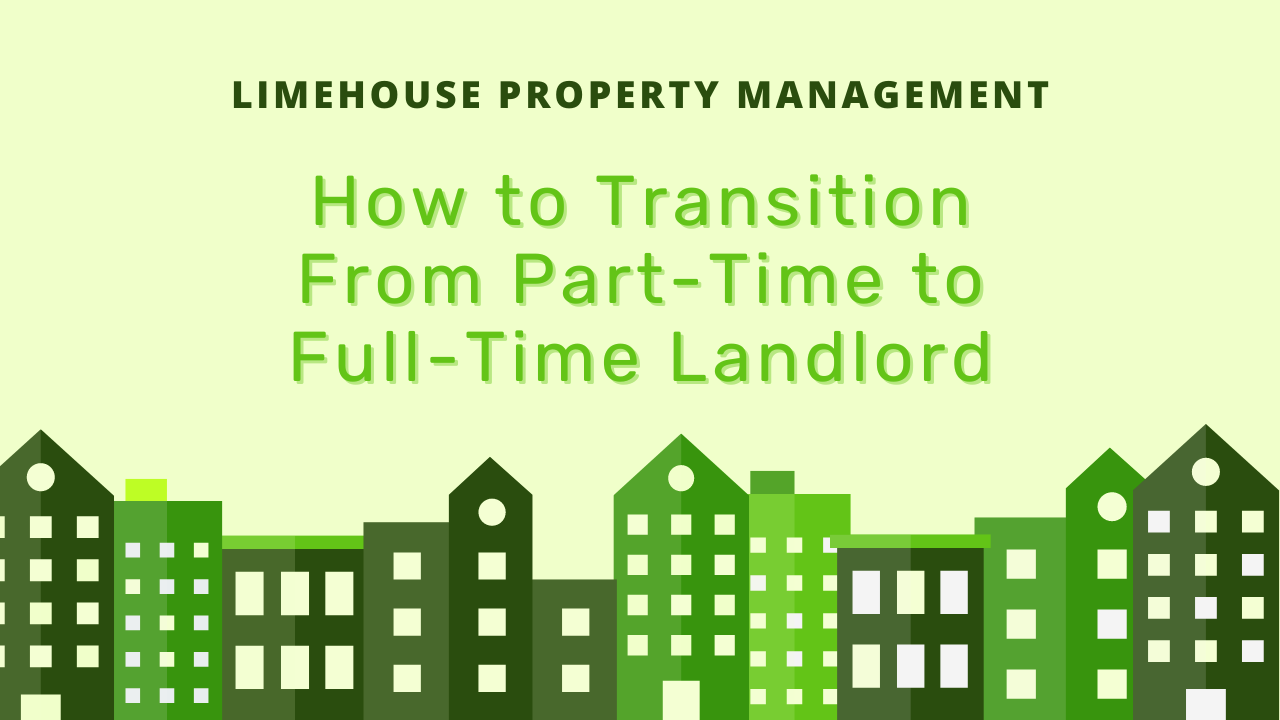How to Transition From Part-Time to Full-Time Landlord

Becoming a full-time landlord is a significant step that can offer financial independence, greater control over your time, and the satisfaction of managing your real estate investments more closely.
However, transitioning from part-time to full-time landlord can be challenging, as it involves careful planning, strategic decisions, and a deep understanding of the responsibilities involved.
Here are the key steps to make this transition smoothly and successfully:
1. Assess Your Financial Situation
Before making any major decisions, it is crucial to thoroughly assess your financial situation. Determine whether your rental income will be sufficient to replace your current income and cover all your expenses, including mortgage payments, property maintenance, insurance, taxes, and personal living costs.
- Calculate Rental Income: First, calculate the total rental income from all your properties. Consider the occupancy rate, rent amounts, and any seasonal fluctuations. It’s essential to be realistic and conservative in your estimates to avoid overestimating your income.
- Evaluate Expenses: Next, list all expenses associated with your properties. These include mortgage payments, property taxes, insurance, maintenance, repairs, utilities, property management fees (if applicable), and legal fees. Don’t forget to factor in unexpected expenses, such as major repairs or vacancies.

- Create a Financial Cushion: It’s wise to have a financial cushion to cover unexpected expenses and vacancies. Aim to have at least three to six months’ worth of expenses saved up. This cushion will provide peace of mind and financial stability as you transition to full-time landlordship.
2. Develop a Solid Business Plan
Transitioning to a full-time landlord is essentially starting a new business. A solid business plan will help you stay organized and focused on your goals.
- Define Your Goals: What do you want to achieve as a full-time landlord? Your goals might include financial independence, growing your property portfolio, or providing high-quality housing to tenants. Clearly defining your goals will help you make strategic decisions.
- Create a Growth Strategy: Consider how you plan to grow your rental business. Will you acquire more properties, invest in different types of real estate, or focus on improving existing properties to increase rental income? Outline a clear growth strategy to guide your efforts.
- Develop Operational Procedures: Create standard operating procedures for managing your properties. These should include processes for tenant screening, lease agreements, rent collection, maintenance requests, and handling disputes. Having clear procedures in place will streamline your operations and ensure consistency.
3. Build a Strong Support Network
Being a full-time landlord requires juggling multiple responsibilities. Building a strong support network can help you manage these tasks more effectively.

- Hire a Property Manager: A professional property manager like the team at Limehouse Property Management can handle tenant screening, rent collection, maintenance, and other tasks, allowing you to focus on strategic aspects of your business.
- Establish Relationships with Contractors: Develop relationships with reliable contractors for maintenance and repairs. Having trusted professionals you can call on will ensure that issues are addressed promptly and efficiently, keeping your tenants happy and your properties in good condition.
- Seek Legal and Financial Advice: Consult with a real estate expert such as a professional property management company to ensure you’re complying with all legal requirements and managing your finances effectively. They can provide valuable guidance on lease agreements, tax strategies, and investment decisions.
4. Enhance Your Skills and Knowledge
As a full-time landlord, you need to be knowledgeable about various aspects of property management and real estate investing. Continuously enhancing your skills and knowledge will help you stay ahead in the industry.
- Attend Workshops and Seminars: Look for workshops and seminars on property management, real estate investing, and landlord-tenant laws. These events can provide valuable insights and networking opportunities. If this is too much work, it’s best to hire a reliable property manager who can do this on your behalf.

- Join Landlord Associations: Joining a landlord association can offer access to resources, training, and support from other landlords. These associations often provide legal updates, educational materials, and advocacy on issues affecting landlords.
- Stay Updated on Laws and Regulations: Landlord-tenant laws and regulations can change frequently. Stay informed about any changes that may affect your business. Subscribe to newsletters, follow relevant blogs, and regularly consult with your attorney to ensure compliance.
5. Work With a Professional Property Manager
Effective property management is key to running a successful rental business. Hiring a property manager with efficient property management systems will help you manage your properties more effectively and provide a better experience for your tenants.
Here are the things that property managers do:
- Use Property Management Software: Property management software can streamline many aspects of your business, from tenant screening and lease management to rent collection and maintenance tracking. Choose software that fits your needs and budget to improve efficiency.
- Automate Rent Collection: Automating rent collection can save time and reduce the risk of late payments. Many property management software solutions offer online rent payment options, making it easier for tenants to pay on time.

- Regularly Inspect Properties: Regular property inspections help you stay on top of maintenance issues and ensure your properties are in good condition. Schedule routine inspections and address any problems promptly to avoid costly repairs later.
6. Plan for the Future
As you transition to a full-time landlord, it’s important to plan for the long-term success of your rental business.
- Set Long-Term Goals: Define your long-term goals and create a roadmap to achieve them. This might include expanding your property portfolio, diversifying your investments, or achieving a certain level of passive income.
- Prepare for Retirement: Consider how your rental income will support your retirement plans. Work with a financial advisor to create a retirement strategy that aligns with your goals and ensures financial security in the future.
- Continuously Evaluate and Adjust: Regularly evaluate your business performance and make adjustments as needed. Monitor your financials, tenant satisfaction, and property condition to identify areas for improvement and ensure long-term success.
Conclusion
Transitioning from a part-time to a full-time landlord is a significant step that requires careful planning, strategic decisions, and ongoing effort. By taking the above tips into consideration, you can successfully make this transition and achieve your goals as a full-time landlord.
Keep in mind that the key to success lies in being proactive, staying informed, and continuously striving for improvement in all aspects of your rental business. Hiring a professional property management company like Limehouse Property Management is one of the easiest ways to ensure success in your rental business.
Contact Limehouse Property Management to ensure the success of your rental business.
